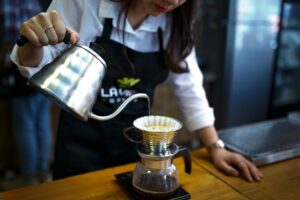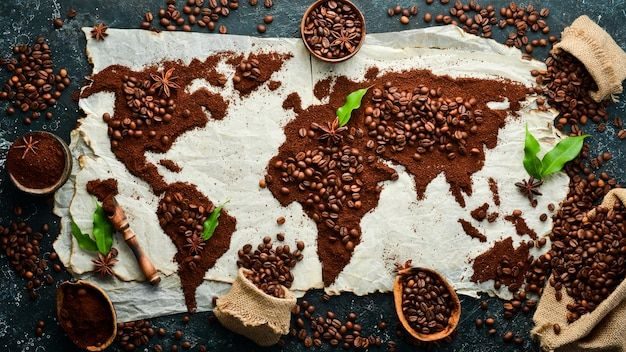The Best Locations Around the Globe for Sampling Amazing Coffee

For coffee enthusiasts and those looking for a coffee shop design to borrow inspiration from, exploring the world isn’t just about seeing new places—it’s about tasting them. Coffee culture varies from country to country, with each destination offering its own unique brew, traditions, and flavors. If you’re looking to combine your love of coffee with your wanderlust, here are some of the best locations around the globe for sampling truly exceptional coffee. 1. Ethiopia: The Birthplace of Coffee Ethiopia is where it all began, making it a must-visit for any coffee lover. The country’s coffee ceremonies are a cultural treasure, offering a rich, immersive experience. Sip freshly brewed coffee made from beans roasted on the spot and served in small cups. Don’t miss: Yirgacheffe: Known for its floral and citrus notes. Harrar: A fruity and wine-like coffee experience. 2. Colombia: A Coffee Paradise Colombia’s lush landscapes produce some of the world’s finest coffee beans. The Coffee Triangle (Zona Cafetera) is a UNESCO World Heritage site and home to traditional coffee farms where you can learn about the production process. Must-try regions include: Quindío: Famous for its medium-bodied, nutty coffees. Antioquia: Offers smooth and chocolatey brews. 3. Italy: The Home of Espresso No list would be complete without Italy, where coffee is an art form. Italians take pride in their espresso culture, often enjoyed standing at the bar. Visit Rome, Florence, or Milan for iconic cafés and classic Italian coffee rituals. Don’t leave without trying: Espresso: Strong and rich, served in small, concentrated shots. Cappuccino: A breakfast staple that combines espresso, steamed milk, and foam. 4. Vietnam: Bold and Unique Vietnamese coffee culture is a delight for those seeking something different. The country’s use of robusta beans gives its coffee a bold flavor, often sweetened with condensed milk. Signature drinks include: Ca Phe Sua Da: Iced coffee with condensed milk. Egg Coffee (Ca Phe Trung): A creamy concoction made with whipped egg yolks, sugar, and coffee. 5. Japan: Precision and Innovation Japan’s coffee scene blends tradition and modernity. The country is known for its attention to detail and innovative brewing techniques. Experience: Kissaten: Traditional Japanese coffee houses that focus on hand-drip coffee. Third-Wave Cafés: Discover specialty shops in Tokyo and Kyoto that serve meticulously crafted coffee. 6. Brazil: The World’s Coffee Giant As the largest coffee producer globally, Brazil offers a wide variety of flavors and experiences. From bustling cities to serene coffee farms, there’s something for every coffee lover. Highlights include: Cafezinho: A small, strong, and sweet coffee served as a gesture of hospitality. Farm Tours: Visit coffee plantations to sample beans fresh from the source. 7. Australia: Home of the Flat White Australia’s coffee culture rivals that of any other country, with an emphasis on high-quality beans and expertly crafted espresso drinks. Melbourne, in particular, is a coffee haven. Must-try: Flat White: A velvety espresso-based drink with microfoam milk. Single-Origin Coffee: Highlighting distinct flavors from specific farms. 8. Turkey: Coffee as Culture Turkish coffee is a UNESCO-recognized cultural heritage, deeply embedded in social and traditional practices. Brewed in a cezve and served unfiltered, it’s a strong, aromatic experience. Don’t miss: Traditional Turkish Coffee: Often accompanied by sweets like Turkish delight. Coffee Fortune-Telling: A fun and unique way to engage with the culture. 9. Costa Rica: Pura Vida in a Cup Costa Rica’s high-altitude farms produce some of the most vibrant and flavorful beans. Known for its sustainability efforts, the country’s coffee farms are a treat for eco-conscious travelers. Signature flavors: Tarrazú: Offers bright acidity and citrusy notes. Doka Estate: A historic coffee farm offering tours and tastings. 10. United States: Innovation and Diversity The U.S. has played a significant role in the third-wave coffee movement, emphasizing quality, sustainability, and innovation. Cities like Seattle, Portland, and New York are hubs for coffee experimentation. Try: Cold Brew: Smooth and refreshing. Nitro Coffee: A creamy and slightly fizzy cold coffee. 11. Guatemala: Bold and Flavorful Guatemala’s volcanic soil and high altitudes contribute to its coffee’s bold, chocolatey, and spicy flavor profiles. Visit: Antigua: Known for its rich and full-bodied coffees. Lake Atitlán: Enjoy coffee with stunning views. Exploring coffee culture around the globe is a journey of flavors, traditions, and unforgettable experiences. Each destination offers a unique way to enjoy this beloved beverage, connecting you to the history and people behind the cup. For those looking at levelling up their barista skills and searching for a barista training course, you’ve come to the right place. Where will your next coffee adventure take you?
Choosing the Right Coffee Maker: A Guide for Coffee Lovers

Picking the perfect coffee maker can feel daunting with so many choices for different tastes, budgets, and brewing styles. Whether you’re a coffee aficionado or just enjoy a casual cup, the right machine can transform your experience. At OnlineBaristaTraining.com, our online barista training helps you navigate these options. Here’s a comparison of top coffee makers across categories, sharpened by skills from our barista course, to guide your decision. 1. Drip Coffee Makers : The Everyday Workhorse Best For: Convenience and brewing large quantities Example: Breville Precision Brewer Features: Programmable options, temperature control, large capacity Pros: User-friendly, great for families or offices, budget-friendly Cons: Less control over variables, may miss flavor depth Drip coffee makers suit those craving consistency with little fuss—a staple in coffee barista training. The Breville Precision Brewer adds customization, ideal for anyone mastering barista classes online. 2. Espresso Machines: For the Coffee Enthusiast Best For: Espresso fans and specialty drink lovers Example: De’Longhi La Specialista Arte Features: Built-in grinder, steam wand, adjustable pressure Pros: True espresso vibes, versatile for lattes and more, sturdy build Cons: Pricey, takes practice Espresso machines like the De’Longhi La Specialista Arte bring café flair home, a focus of our online barista course. They demand skill—perfect for barista training grads aiming for precision. 3. Single-Serve Coffee Makers: Quick and Convenient Best For: Solo drinkers and busy schedules Example: Keurig K-Supreme Plus Smart Features: Pod-compatible, adjustable strength and temp, fast brewing Pros: Super easy, low cleanup, flavor variety Cons: Costly per cup, less eco-friendly Single-serve options like the Keurig K-Supreme Plus Smart are a time-saver, a tip from barista certification pros. They’re versatile but might not thrill purists in barista training courses. 4. French Press: Simple and Rich Best For: Full-bodied coffee fans Example: Bodum Chambord French Press Features: Manual brewing, glass and steel build, no filters Pros: Rich flavor from natural oils, easy cleanup, affordable Cons: Needs timing precision, not for big batches A French Press like the Bodum Chambord delivers bold taste, a craft taught in barista lessons online. It’s perfect for baristas meaning those who savor the brewing art. 5. Pour-Over Coffee Makers: Precision and Flavor Best For: Control-obsessed coffee buffs Example: Hario V60 Features: Needs gooseneck kettle, portable, manual design Pros: Total brewing control, highlights subtle flavors, minimalist Cons: Time-heavy, skill-based Pour-over setups like the Hario V60 shine for precision, a skill honed in coffee barista training. They’re a favorite for those asking what is barista perfection. 6. Cold Brew Coffee Makers: Smooth and Refreshing Best For: Iced coffee lovers and low-acid fans Example: OXO Brew Compact Cold Brew Coffee Maker Features: Immersion system, compact, makes concentrate Pros: Smooth taste, batch-ready, long-lasting concentrate Cons: 12-24 hour brew time, less versatile Cold brew makers like the OXO Brew Compact offer mellow sips, a trick from online barista course. They’re great for barista training pros eyeing refreshing options. 7. Smart Coffee Makers : The Tech – Savvy Option Best For: Tech lovers and smart home fans Example: Smarter Coffee 2nd Generation Features: Wi-Fi, customizable settings, smart home integration Pros: Automated convenience, pre-wake brewing, sleek look Cons: Expensive, needs internet Smart machines like the Smarter Coffee 2nd Generation merge tech with coffee, a perk of barista classes online. They fit modern coffee barista training lifestyles. Conclusion: Choosing the Right Machine Your ideal coffee maker depends on your life, budget, and taste—speed, control, or flavor? Experiment to find your match with online barista training from OnlineBaristaTraining.com. What’s your go-to? Share with our community! Kickstart your day with morning boost coffee bean tips for the perfect brew.Discover essential quality hacks for small coffee shop success.
4 Essential Coffee Shop Manager Interview Questions

Hiring a coffee shop manager can feel daunting for many owners. It’s a role that demands trust—after all, a manager acts as your stand-in, running the show when you can’t. At OnlineBaristaTraining.com, we’ve seen how owners often delay this hire, searching for a “mini-me” instead of focusing on the skills that matter. But here’s the truth: a great manager doesn’t need to mirror you—they need to excel at the job. Through our online barista training and barista certification programs, we’ve learned what makes a manager thrive, and it starts with asking the right coffee shop interview questions. Why hire a manager? Beyond trust, it’s about easing your load. A skilled manager handles training, feedback, inventory, and reporting—tasks our barista training courses prepare people for daily. Don’t let guilt stop you from seeking help; running a coffee shop solo leads to burnout. Embrace that two heads are better than one, and let’s dive into the barista interview questions that predict success. A Note on Open-Ended Questions: Our questions are open-ended to let candidates shine with their own stories. Interviews can be nerve-wracking, though—so if a candidate stumbles, it’s not a dealbreaker. Have examples ready to prompt them, like ones from our coffee barista training, to keep the conversation flowing. Tell me about a time you had to make a quick decision without all the info. How did you handle it? Coffee shops move fast—there’s no escaping it. A manager faces snap decisions daily: a customer issue, a missing ingredient, or a broken machine. Our barista course teaches quick thinking, and your manager needs it too. Look for a candidate who sets the scene, walks through their process, and picks a practical solution. It’s less about the “perfect” fix and more about rational action under pressure. For example: “Our espresso machine died mid-rush. I alerted customers and suggested alternatives from our barista lessons online—keeping the line moving.” The outcome? A decision was made fast, with reflection saved for later. Tell me about a time you faced a big change. How did you handle it? What did you learn? While question one tackles daily chaos, this digs into personal growth—a must for managers. Our online barista course emphasizes adaptability, and we want managers who turn challenges into lessons. A strong answer reveals how they navigate tough shifts and grow from them. Share your own story to spark theirs: “Starting my shop was a whirlwind. I took on too much, learned my limits, and sought a manager. That’s why I’m here!” Whether they’ve mastered barista classes online or life’s curveballs, growth matters. Tell me about a time you made a mistake. How did you handle it? What did you learn? Mistakes happen—even the best managers slip up. What counts is owning it and improving. Our barista training instills accountability, and your manager should set that tone for the team. Listen for how they fixed it and prevented repeats. A top answer might be: “I forgot to order syrup, so I set reminders and added it to a checklist.” Proactive fixes signal leadership. Try sharing a mistake from your own café days—maybe one you nailed or one you’d tweak—to see if their approach aligns or inspires. We have daily (weekly, monthly) team sales goals. How would you achieve them? How would you share them with the team? What’s your follow-up? Even without set goals, this question tests business savvy. Coffee shops aren’t charities—managers must keep numbers in mind. Our online barista training covers sales strategies, and your manager should too. A great candidate will outline motivating the team (think baristas meaning skilled sellers, not just brewers) to boost tickets—maybe suggesting add-ons or coaching strugglers. Example: “I’d set mini-goals from my barista course, share them in huddles, and check in weekly.” They should balance team spirit with profit focus. Brewing Success Starts Here Hiring a manager isn’t about cloning yourself—it’s about finding someone who excels where you need support. These interview questions for a cafe cut through the noise to reveal capability, not just likability. At Online Barista Training, our barista classes online and barista training courses prepare pros for every role—barista or boss. Ready to find your perfect fit? Explore our online barista course to sharpen your team—or yourself—today! Boost your skills with coffee classes online tailored for café pros. Ace hiring with cafe planning strategies for a top team.


